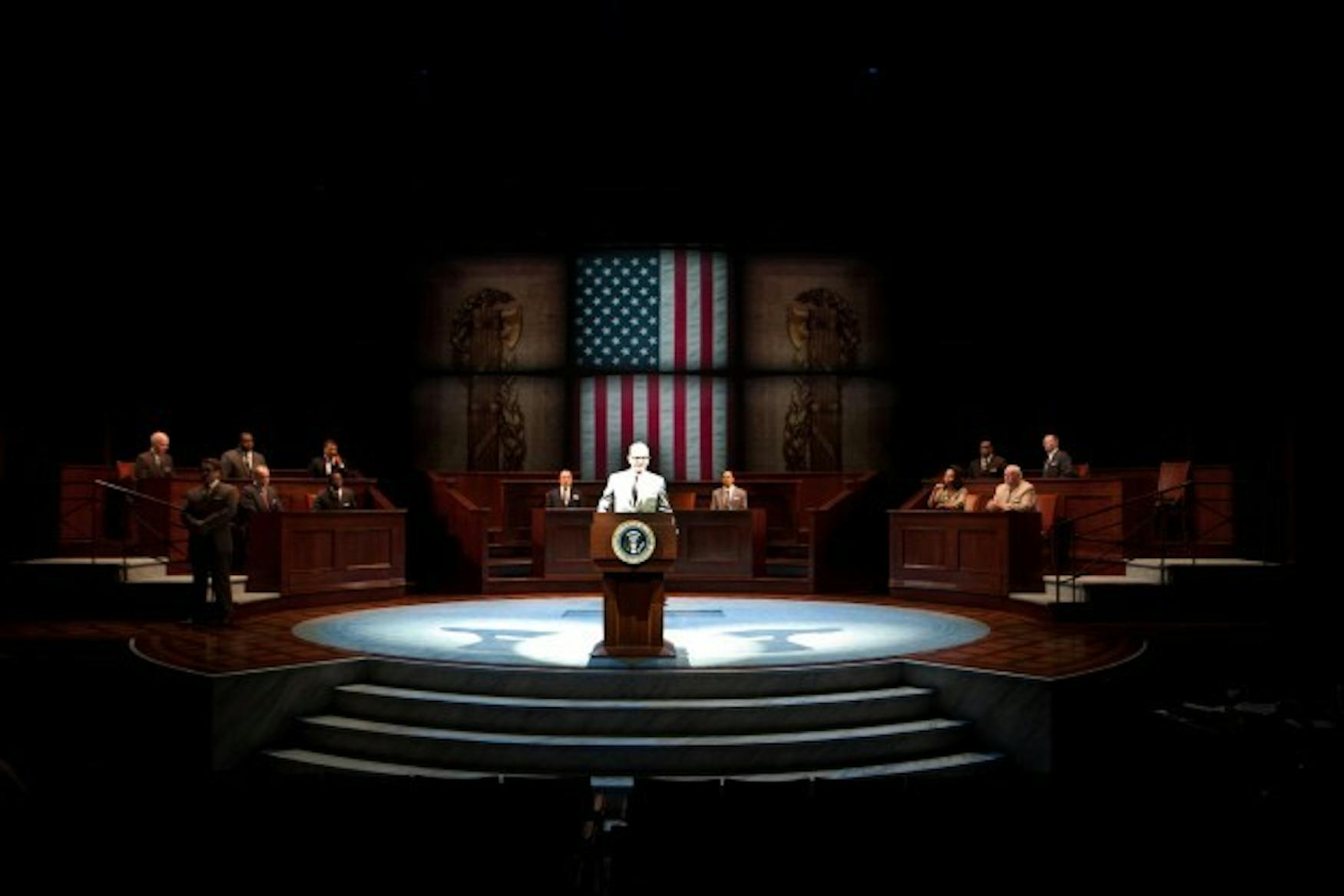Play retells controversies of the 1960s
"Politics is war. Period."
These words are spoken at the beginning of the second act of All the Way, an excellent play produced by the American Repertory Theater, which showed in Cambridge this weekend. The production follows the early days of Lyndon B. Johnson's presidency, his fight for the passage of the Civil Rights Act of 1964 and his struggle to get reelected later that same year. The play was written by Pulitzer Prize winner Robert Schenkkan and was directed by Bill Rauch.
Throughout the show, Johnson had to battle tooth-and-nail in order to fulfill his political agenda. The play follows much of the back room politics that LBJ (and his future vice president Hubert Humphrey) used to make the necessary deals. Johnson and his crew spend the show fighting the civil rights leaders (who fear Johnson is doing too little for their cause) and the Southern democrats who worry that Johnson is changing not only the shape of the Democratic party, but their very way of life. To him, politics really is war, and Johnson will not stop until he has won. The title "All The Way" not only refers to the slogan of his reelection campaign, but to his desire to push civil rights until everyone is equal.
The highlight of this production, however, was watching the truly incredible Bryan Cranston personify the fiery, Texan spirit of our 36th president. Johnson's role was by far the best written in the show, giving Cranston many crass yet memorable lines and monologues. Cranston embodied Johnson, both physically and vocally, as he spoke in a raspy, Southern accent for the entirety of the show. It was a remarkable performance by a man who has proven his versatility time and time again; from playing Hal on Malcolm in the Middle to the notorious Walter White on Breaking Bad, Cranston transitioned beautifully to the stage. If the show makes it to Broadway, I could easily see him winning a Tony award.
As for other characters, Brandon J. Dirden captured the essence of Dr. Martin Luther King, Jr. in an emotional and convincing performance. Dirden played King as a man motivated to see equality for all Americans, yet troubled by the political compromises he faced in order to make his dream a reality.
Furthermore, Reed Birney shined as the up-and-coming Hubert Humphrey, and Dakin Matthews was excellent as Richard "Dick" Russell, a Georgia senator and mentor to Johnson who strongly disagrees with the Civil Rights Act. J. Bernard Calloway MFA '00, portrayed King's ally, Rev. Ralph Abernathy, as a character driven by the fight for civil rights in a strong supporting performance.
Another incredible aspect of the show was the set. The basic setup was designed to look like the inside of the House of Representatives, with three rows of desks rising in a semicircle around the center of the stage. Occasionally, a desk would rise up at center stage to portray the Oval Office, and props were often carried on and off the stage. The lighting was an important tool as well, and helped to switch from scene to scene with precision by highlighting those who were speaking. Whenever Cranston was given a monologue, a spotlight would hit him, which both allowed him to command the stage and forced the audience to pay attention to what he was saying.
Perhaps the most impressive piece of the set was a giant screen at the back of the stage. The screen was lit up with six 1960s-era looking television screens, rounded at the corners and sides. The screens were mainly used to portray the settings-showing the windows of the Oval Office when Johnson was in the White House, or even the outside of hotels or houses during important scenes with Martin Luther King, Jr. The screens were also lit up to show the passage of time by frequently telling how many days were left until the 1964 election. It also allowed for several settings to be portrayed at once. One particularly striking scene portrayed King in Geneva, J. Edgar Hoover in his FBI office and President Johnson in his office all at the same time, with their dialogues all overlapping. The screens made this scene possible, and it was truly magnificent to watch.
Despite the slightly-too-long three-hour running time, I would highly recommend All the Way to everyone who has the chance to see it. Whether you're a fan of history, a fan of Bryan Cranston or just a fan of theater in general, it's an excellent way to spend an evening.
*



Please note All comments are eligible for publication in The Justice.